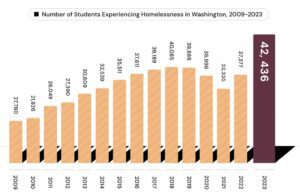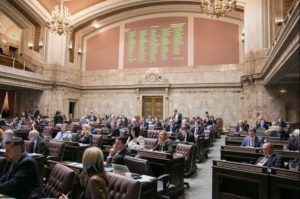Legislative Issue Brief: Student Homelessness
By Jacob Vela, League of Education Voters Chief Policy Officer, and Aaron Yared, Director of Policy & Advocacy at Building Changes
In order for students to be ready for learning, their basic physical, social, and emotional needs must be met. When these needs go unmet, students can struggle to stay engaged in school or even regularly attend school. This is especially true for students experiencing homelessness, who often don’t know where they will sleep week-to-week or if they will have access to enough food to sustain their nutritional needs.
Outside of the years of the pandemic, the number of Washington students experiencing homelessness has seen steady increases since the Office of the Superintendent of Public Instruction began monitoring the number annually.[1]

As the resources needed to support the increased needs of students experiencing homelessness have grown in recent years, state and federal supports have become increasingly uncertain. Read More
 In the
In the 
 In this episode, League of Education Voters CEO Arik Korman interviews Yale School of Management professor Ebony Reed, a seasoned journalist who is also the Chief Strategy Officer at
In this episode, League of Education Voters CEO Arik Korman interviews Yale School of Management professor Ebony Reed, a seasoned journalist who is also the Chief Strategy Officer at 
 In this episode, League of Education Voters CEO Arik Korman interviews game-changing disability rights attorney
In this episode, League of Education Voters CEO Arik Korman interviews game-changing disability rights attorney